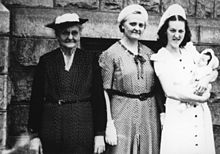generation
In biology, a generation is the totality of all living beings that have approximately the same distance from their common ancestors or their descendants within their parentage group (e.g. the generation of grandparents , parents , children ). In sociology , the term is taken up and used to work out the social character of different successive age cohorts, see Generation (Society) .
genealogy
In family history research ( genealogy ), a generation is the totality of all living beings that are connected to other living beings in an ascending or descending line by descent and are at the same distance. Assuming a test person or a generation of test persons of the same age, one can speak of the first, second, third etc. generation of ancestors or descendants of a test person or a test person generation. In genealogical lists and tables, it is common to identify the generations by prefixing Roman numerals , for example in front of the Kekulé numbers (see also generation names ).
biology
In biology , too , generation - as in genealogy - always describes the individual levels of a lineage (cf. parental generation ). However, a generational change can occur here as a special feature , in which a bisexual generation is followed by an asexually multiplying generation and after this again a bisexual generation. A generational change is often accompanied by a change in the core phase . In such cases, one can speak of a “new generation” even if it arose as a result of asexual reproduction, i.e. from a genetic point of view it is a clone of the previous generation .
Generation gap
Mean generation gap
The generation gap , generation duration or generation span is the average of the age difference between all children and their father or mother in years. Corresponding to the differences in the median age of marriage between men and women, the generation gap with the father is usually greater than that with the mother. In ten generations there is therefore about a generation span more in the maternal line than in the father line.
Before 1800, the mean generation gap was over 30 years. In 1875 Gustav von Rümelin calculated an average generation time of 36.5 years for Germany and 34.5 years for France. To this he added the mean marriage age of the men and half the duration of the mean marital fertility. Around the middle of the 20th century, the mean generation gap fell by a few years because the majority of children were born to mothers under the age of 25 who then had hardly any further children. In the past, numerous children were born to mothers over the age of 30 or 40. In the past two decades, this downward trend has reversed again in Germany, and the generation gap has grown again.
In demography , the generation gap is one of the parameters used to describe generative behavior , which is also used to forecast the population.
record
The greatest number of generations that have been proven to be alive in a family at the same time were seven: in 1989, the then 109-year-old Augusta Bunge from Wisconsin witnessed the birth of a great-great-great-great-grandchild.
See also
- Generation designations (genealogy)
- Generation time (time to double the population size)
- Voltinism ( entomology : number of generations of a species completed each year.)
Web links
- Bernd Weisbrod: Generation and Generationality in Modern History. In From Politics and Contemporary History . February 16, 2005, accessed October 5, 2018.
Individual evidence
- ↑ quoted from Karl Mannheim : The problem of the generation. In: Karl Mannheim: sociology of knowledge - selection from the work (= sociological texts . Volume 28). Introduced and edited by Kurt H. Wolff . Luchterhand, Berlin et al. 1964, pp. 509–613, here p. 512.
- ↑ Entry: Most living generations (ever). In: Guinness Book of Records . Retrieved October 5, 2018 . And: Forum thread: Augusta Bunge Pagel (1879–1989). In: 110club.com. Retrieved October 5, 2018 .
